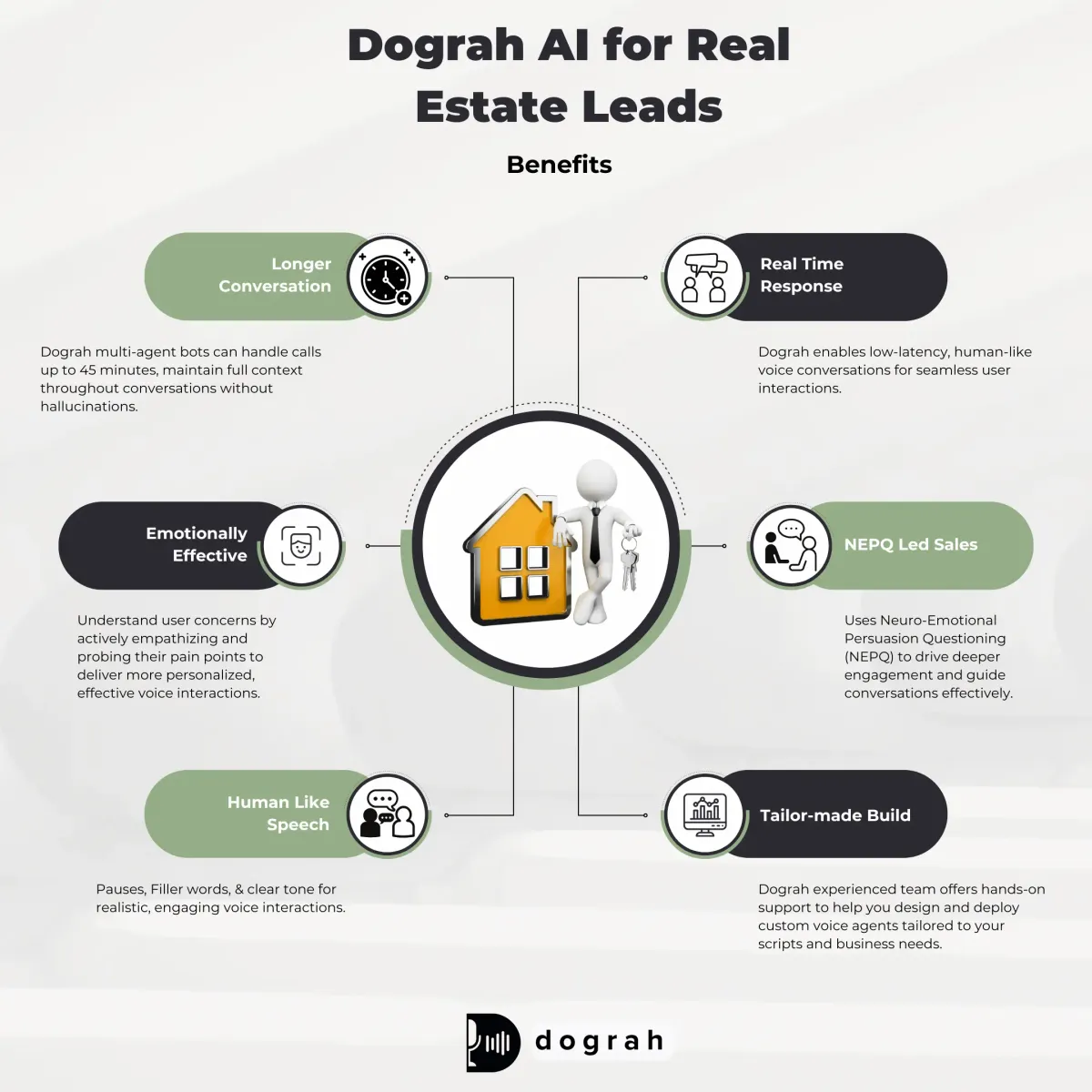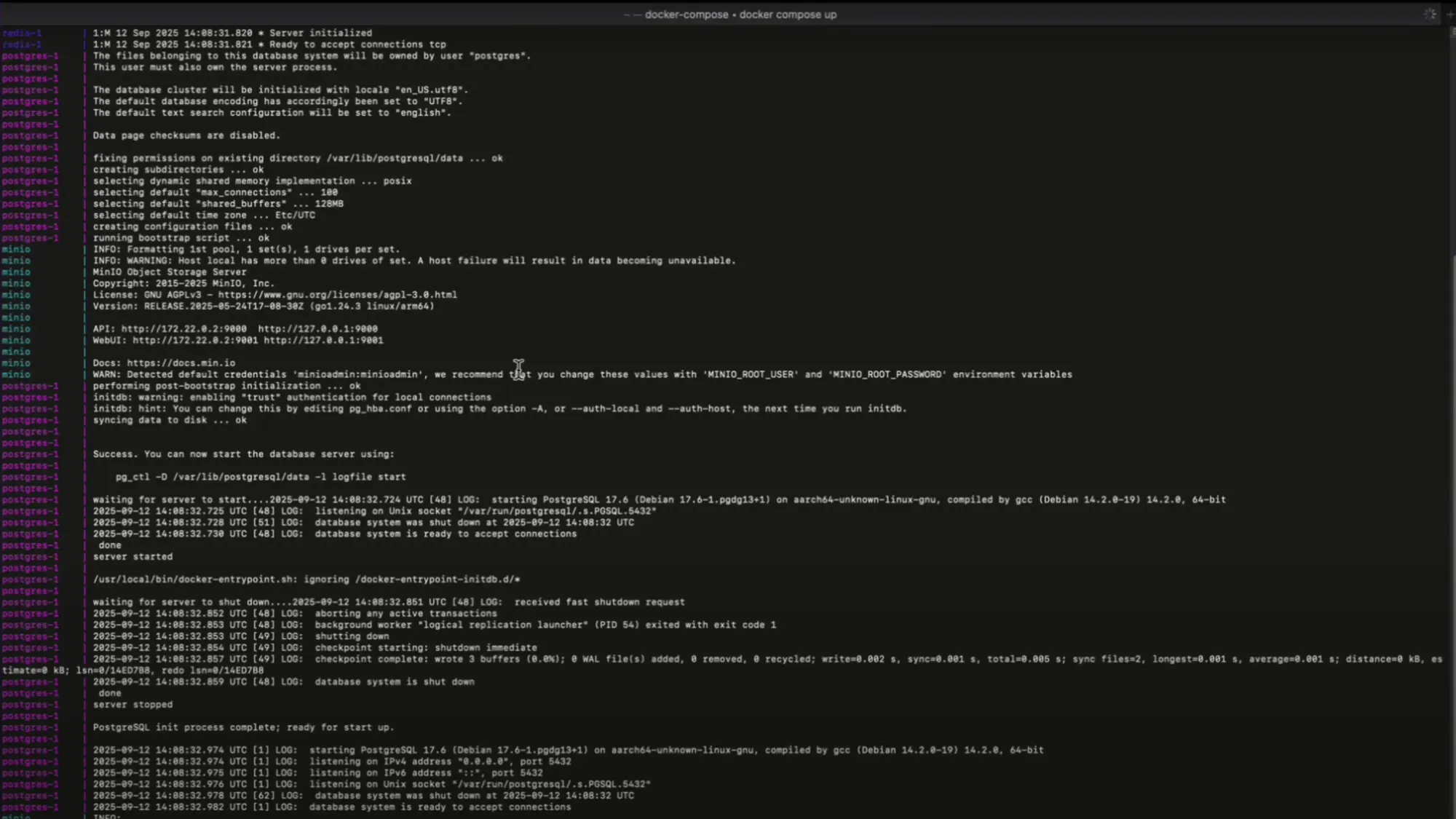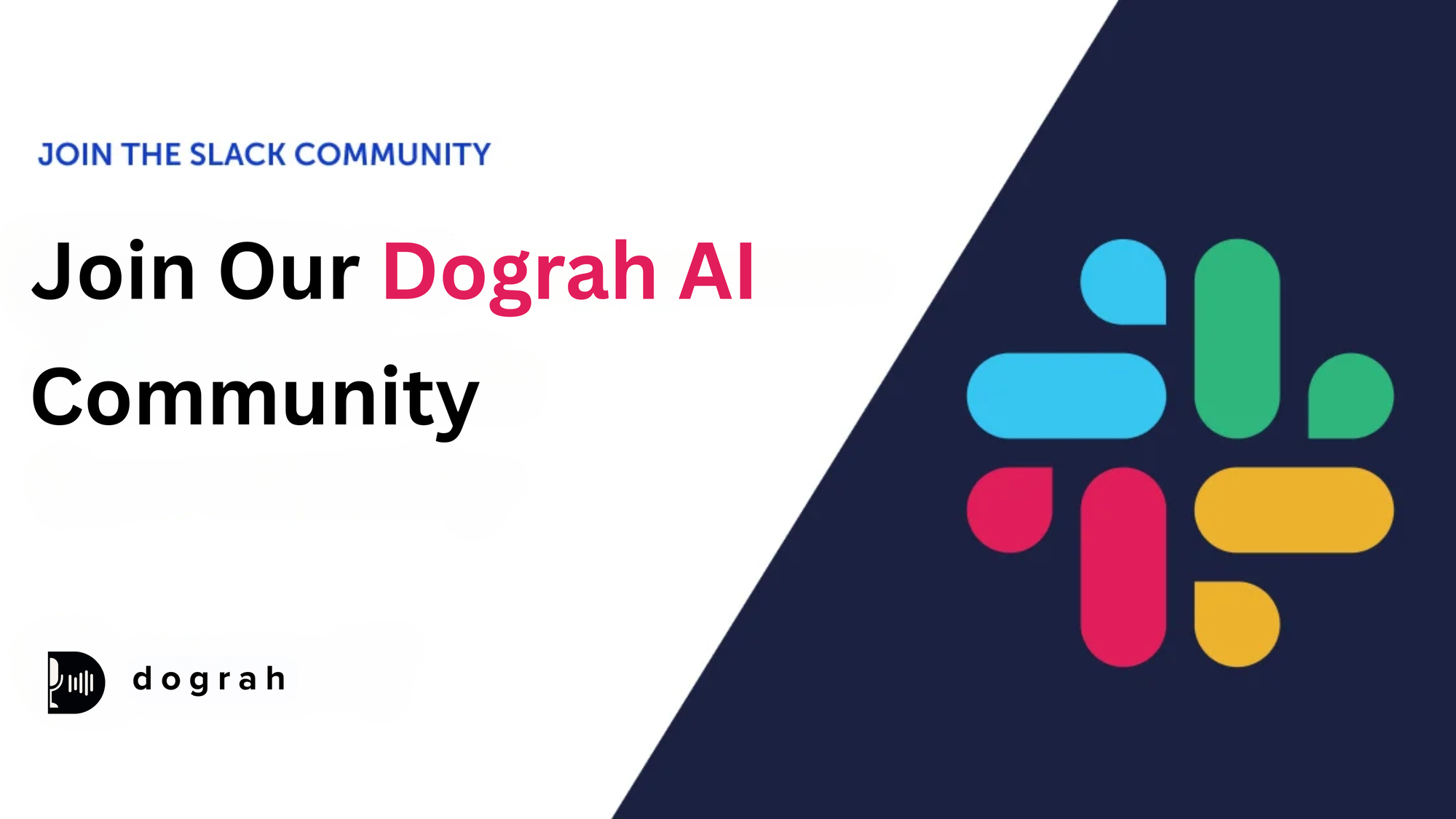The Real Estate Agent AI global market was valued at 3.9 trillion in 2023 and is expected to grow 4.12 trillion in 2024. This trend shows that the Real Estate companies are extensively using AI and Generative AI for lead generation, lead screening, outbound calling, and appointment booking. Making the process seamless, increasing the efficiency of client interaction and boosting conversion rate.
According to the 2024 New Delta Media Survey, 75% of top U.S. brokerages have already adopted AI technologies and are steadily integrating them into their operations.

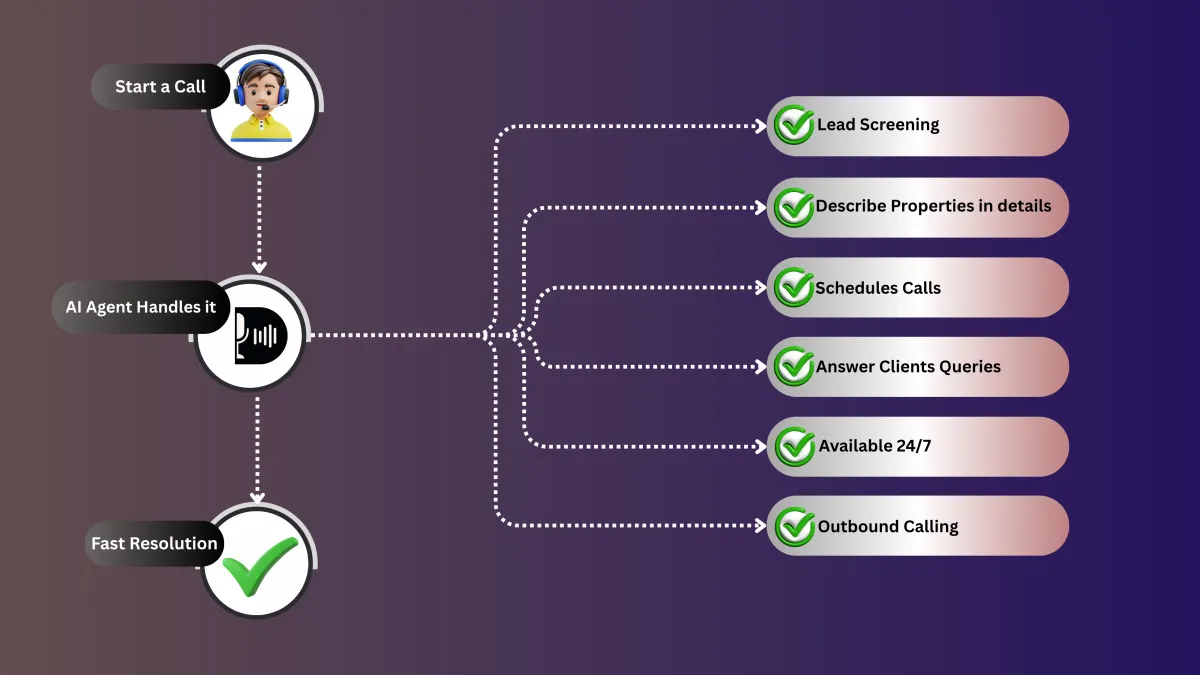
AI for Real Estate Leads : Best Tools & Solutions
What are AI Agents and Real Estate AI Agents?
AI Agents are autonomous software systems that leverage artificial intelligence to perform tasks and make decisions on behalf of users. They utilize technologies such as Speech-to-Text (STT), Text-to-Speech (TTS), Automatic Speech Recognition (ASR), and Neuro-Emotional Persuasion Questioning (NEPQ). In real estate, these agents function like virtual assistants interacting with leads, handling lead screening, nurturing prospects, qualifying buyers, scheduling appointments, making outbound calls, providing 24/7 support, and ultimately driving lead conversion.
An Open Source AI Voice Agent for real estate like Dograh AI seamlessly integrates with your CRM, making the entire process faster and more efficient.
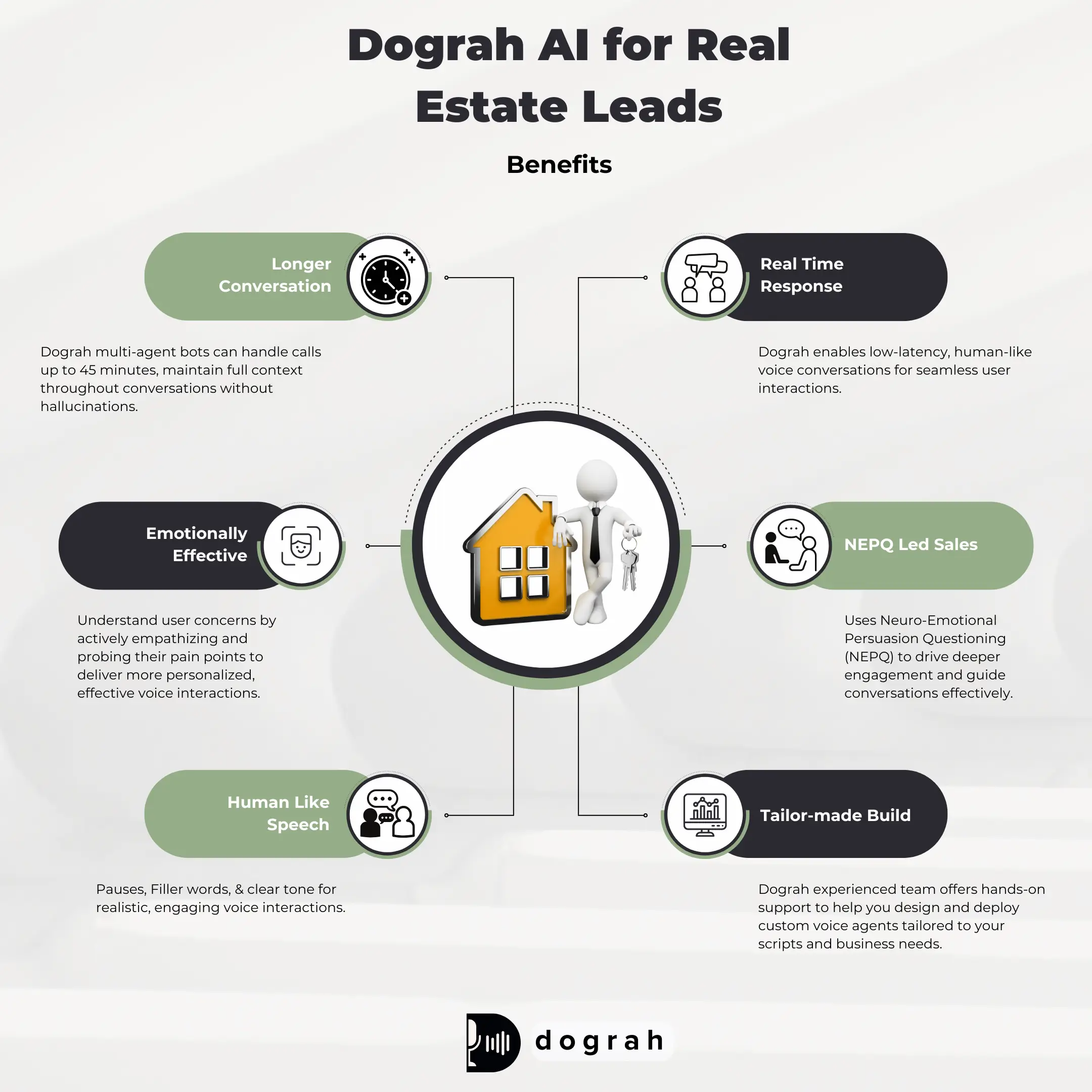
Key Features of Dograh AI Agents
- Longer Conversation : Dograh multi-agent bots can handle calls up to 45 minutes, maintain full context throughout conversations without hallucinations.
- Real Time Response : Dograh enables low-latency, human-like voice conversations for seamless user interactions.
- NEPQ Led Sales : Uses Neuro-Emotional Persuasion Questioning (NEPQ) to drive deeper engagement and guide conversations effectively.
- Tailor-made Build : Dograh experienced team offers hands-on support to help you design and deploy custom voice agents tailored to your scripts and business needs.
- Emotionally Effective : Understand user concerns by actively empathizing and probing their pain points to deliver more personalized, effective voice interactions.
- Human Like Speech : Pauses, Filler words, & clear tone for realistic, engaging voice interactions.

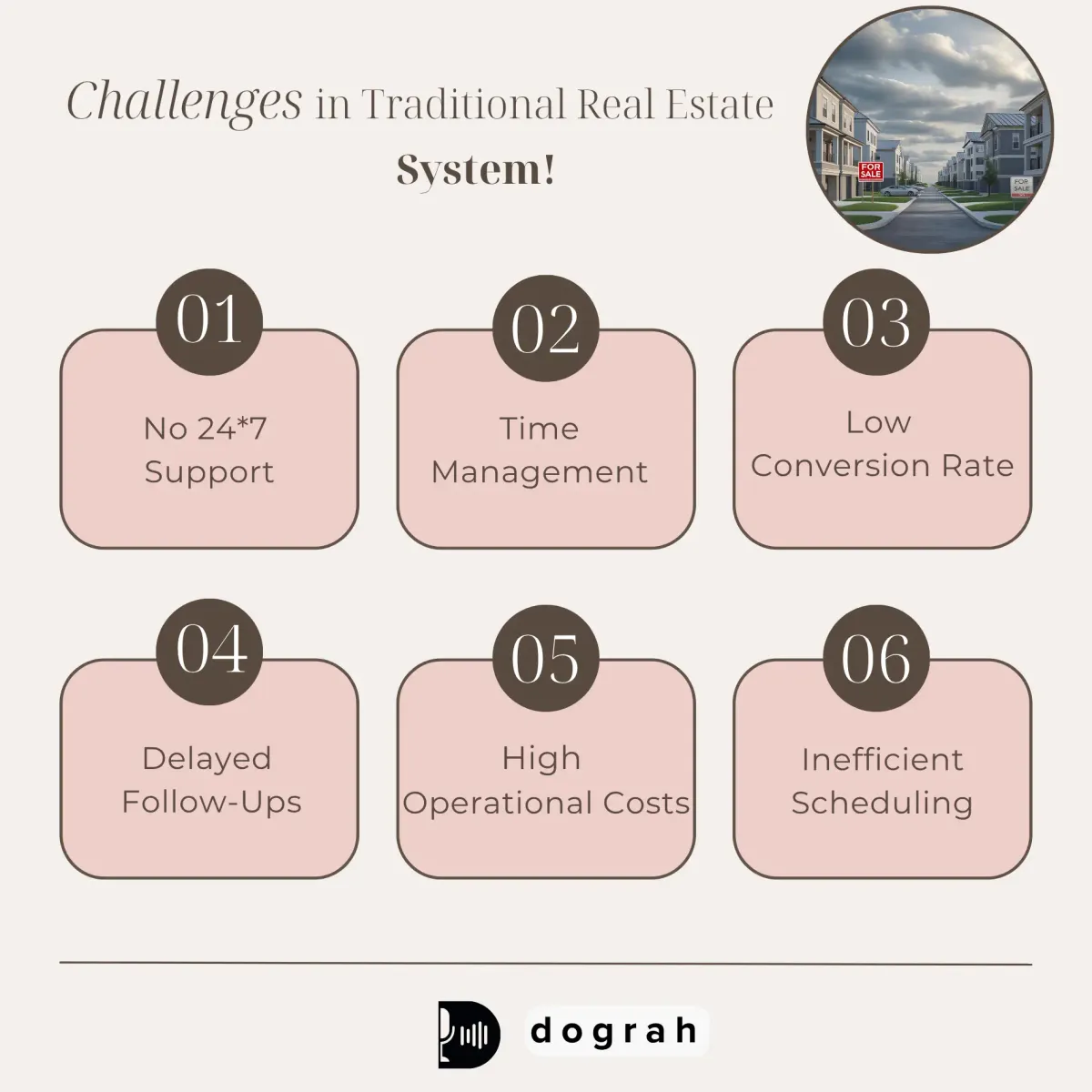
What Does AI mean in Real Estate : Future Trends
How does AI in Real Estate Work - Use Cases
Dograh AI streamlines real estate operations by aligning with your core needs and current industry trends. It offers a user-friendly drag-and-drop builder and integrates effortlessly with all major third-party platforms.
1. Data Collection and Analysis
AI collects and processes data from a wide range of sources, including property listings, public records, mortgage data, economic indicators, and social sentiment. Real estate professionals using AI powered predictive tools to uncover patterns and trends in market activity and user behavior that human analysts might overlook. These insights empower investors to make smarter, data-driven decisions when buying or selling properties.
2. Prediction and Valuation
Machine learning analyzes past sales, property details, local amenities, and market trends to predict property values and pricing changes. CAPE Analytics, for example, increased valuation accuracy by 7.7% and reduced manual inspections by 50%, helping streamline real estate decisions.
3. Personalized Recommendation
AI personalizes property recommendations for buyers, renters, and investors by analyzing their preferences, behavior, and search history. As N. Crosby noted, “Our best model created predictions of house price that were accurate within 10 percent of the actual sale price over 63 percent of the time”.
4. Automation and Efficiency
AI automates routine tasks such as scheduling viewings, responding to inquiries, and handling paperwork, making daily operations more efficient. This allows real estate agents to focus on higher-value activities like closing deals and building client relationships. Properties promoted with AI-driven tools have shown a 22% boost in sales, demonstrating the technology’s strong influence on productivity and growth in the industry.
5. AI for real estate leads
AI agents can talk to leads, handle objections, schedule bookings and work 24*7 to ensure no calls get missed. And all this while creating more free time for actual deals. As one Reddit user put it, “AI is the future it makes things easier, from finding the right audience to dialing and confirming appointments. I’ve seen it in action and plan to use it myself soon.”
6. AI cold calling real estate
AI voice agents can make outbound calls to clients, sharing information or gathering details at scale. With human-like conversation, they hold real, engaging conversations making cold calling more efficient and far-reaching.
7. AI for real estate listings
AI tools used to generate listings ideas for eye-catching posts, complete with engaging visuals and captions that attract buyers and sellers. As noted by Al-Qawasmi (2022, p.231), AI also plays a key role in property valuation, including real estate, land, mass appraisal for taxation, and rental value assessments.

Business Benefits of Using an AI Agent for Real Estate Purposes
1. Improved Efficiency and Automation
AI agents take care of repetitive tasks such as lead qualification, appointment scheduling, and follow-ups saving time and improving productivity. Tools like Dograh AI make this process seamless and efficient.
2. Risk Management
AI helps spot market risks and warning signs by analyzing past data and trends, leading to smarter investment choices. A study by Verma et al. (2019) found that AI models can predict real estate values with 96% accuracy, boosting both decision-making and overall business performance.
3. Data-Driven Decision-Making
With real-time insights and predictive analytics, agents can make smarter choices in pricing, marketing, and targeting the right clients. AI tools analyze patterns and trends in market data and user behavior that humans might overlook, helping investors make better property buying and selling decisions.
4. Enhanced Security and Compliance
AI systems securely manage data, automate compliance checks, and reduce human errors in documentation. With automated monitoring, they help ensure data privacy and meet regulatory standards lowering the risk of legal issues.
5. 24/7 Availability
AI voice agents work around the clock responding to leads, answering queries, and scheduling appointments even after hours. This ensures no opportunity is lost and significantly boosts customer satisfaction and engagement.
6. Boost property sales with AI-powered real estate agents
AI-powered agents tailor outreach, improve communication, and boost conversions thus helping businesses close deals faster and more efficiently. In fact, 97% of small and mid-sized businesses using AI voice agents report higher revenue, better customer engagement, and stronger market presence.

How to Build AI Voice Agent with No Code (Step by Step) ~ Dograh
How Generative AI in Real Estate Will Transform the Market Dynamics
Generative AI is set to transform real estate market dynamics by streamlining property management, enhancing market analysis, and enabling smarter, faster decision-making. Valued at $351.9 million in 2022, the generative AI market in real estate is projected to reach $1,047 million by 2032, growing at a CAGR of 11.52%. As Michael Minard, CEO of Delta Media, puts it, “AI has become one of real estate's fastest-adopted technology tools, embraced by brokerages and agents at a breakneck speed.”
Conclusion
AI is reshaping the real estate industry by equipping agents and firms with tools to boost efficiency, make smarter decisions, and improve client service. Currently, 45% of AI-driven real estate startups are still in early development, 20% at the incubator or seed stage, and 25% with early VC funding while only 15% have reached late-stage investment, showing the sector’s youth and huge growth potential. As Burton Kelso, Chief Tech Expert at Integral, notes, “Businesses and individuals cannot afford to ignore AI adoption. Companies that miss the AI wave are likely to face significant setbacks.” Notably, properties marketed with AI-powered tools have seen a 22% increase in sales, proving AI’s powerful role in driving real results.
Getting started with Dograh
Interested in leveraging Dograh for lead generation, cold calling or business automation ? Here’s a streamlined path to getting started, along with direct links to essential resources :
1. Dograh AI: Quick Start Demo
2. Run Docker Command
Download and Start Dograh first startup may take 2-3 mins to download all images
3. Quick Start Instructions
How to Build AI Voice Agent - Step by Step with Dograh
Step by step written guide to building and deploying your first voice AI Agent
- Open Dashboard: Launch http://localhost:3000 on your browser.
- Choose Call Type: Select Inbound or Outbound calling.
- Name Your Bot: Use a short two-word name (e.g., Lead Qualification).
- Describe Use Case: In 5–10 words (e.g., Screen insurance form submissions for purchase intent).
- Launch: Your bot is ready! Open the bot and click Web Call to talk to it.
4. Community & Support
Join Slack Community and discuss issue with Dograh experts :
5. Additional Resource
Related Blog
- Discover the Top AI Communities to Join in 2025 for innovation and collaboration.
- Learn what makes Voice-Enabled AI Workflow Builders Effective in 2025.
- Discover how Making AI Outbound Calls Work: A Technical Guide for Call Centers can streamline automation and boost call efficiency.
- Explore AI Outbound Calling in 2025: What Actually Works Now to learn proven strategies for effective, real-world voice automation.
- See how 24/7 Virtual Receptionist Helps Small Firms Win More Clients by boosting responsiveness and improving customer engagement.
- Learn how How Call Automation Cuts Outbound Calling Costs by 60%: Virtual Assistant Guide can transform your call center’s efficiency and savings.
- Check out "The Ultimate Guide to Reduce Speech Latency in AI Calling [Proven]" for expert tips on making your voice agents faster and more responsive.
FAQ's
1. Can AI replace a real estate agent?
AI can’t fully replace a real estate agent, but it can enhance their performance by enabling better decision-making and automating routine tasks. This leads to higher lead conversion rates and more efficient client interactions.
2. Is AI agent free?
AI agents may not always be free, but Dograh Voice AI Agent is completely free and open-source. It features a no-code drag-and-drop workflow with seamless CRM integration, making it easy and cost-effective to use.
3. What are the risks of AI in real estate?
AI in real estate carries risks like data privacy issues, biased algorithms, and over-reliance on automation. Dograh helps mitigate these risks with built-in compliance, transparency, and ethical AI workflows.
4. How to use AI to sell properties?
To sell properties with AI, automate lead follow-ups, schedule booking, and engage clients through personalized interactions. Dograh integrates with your CRM to streamline this process, making property sales faster and more efficient.
5. What is the best website platform for real estate agents?
The best website platform for real estate agents is Dograh, an open-source, intuitive tool with a drag-and-drop workflow. It features NEPQ-led sales (Neuro-Emotional Persuasion Questioning) and human-like voice conversations to boost engagement and close more deals.
Was this article helpful?

